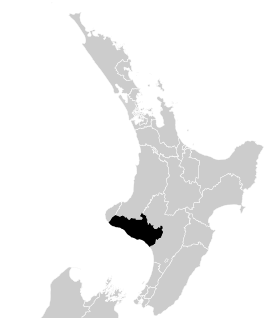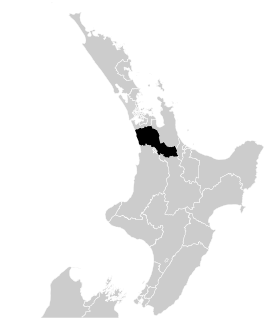Related Research Articles
Masterton was a New Zealand electorate from 1887 to 1946, focused on the town of Masterton and the surrounding area.

Whanganui is a New Zealand parliamentary electorate. It was first established in 1860 for the 3rd Parliament and has existed continuously since then.

Waikato is an electorate in the New Zealand Parliament. A Waikato electorate was first created in 1871 and an electorate by this name has existed from 1871 to 1963, 1969 to 1996, and 2008 to the present, though exact borders have often changed.

Eden, a former New Zealand parliamentary electorate, lay in the general area of the suburb of Mount Eden in the city of Auckland.
Waitemata was a New Zealand parliamentary electorate, from 1871 to 1946, and then from 1954 to 1978. It was represented by 18 members of parliament.
Manukau is a former New Zealand parliamentary electorate in the south Auckland Region. It existed from 1881 to 1978, with a break from 1938 to 1954. It was represented by nine Members of Parliament. Two by-elections were held in the electorate.
Grey Lynn is a former New Zealand parliamentary electorate, in the city of Auckland. It existed from 1902 to 1978, and was represented by nine Members of Parliament.
Christchurch North is a former New Zealand parliamentary electorate. The electorate comprised the northern half of what is now considered the Christchurch Central City.
Riccarton is a former New Zealand parliamentary electorate. It existed from 1893 to 1978, and was represented by eight Members of Parliament.
Mid-Canterbury was a New Zealand parliamentary electorate in rural Canterbury. It existed from 1928 to 1946 and was represented by six Members of Parliament, including Mary Grigg, the first woman National Party MP.
Kaipara is a former New Zealand parliamentary electorate north of Auckland that existed from 1902 to 1946, and from 1978 to 1996.
Parnell was a parliamentary electorate in the city of Auckland, New Zealand, from 1861 to 1954, with one break of eight years.
Westland was a parliamentary electorate in the West Coast of New Zealand from 1866 to 1868 and 1890 to 1972. In 1972 the Tasman and West Coast electorates replaced the former Buller and Westland electorates.
Temuka was a parliamentary electorate in the Canterbury region of New Zealand from 1911 to 1946. The electorate was represented by four Members of Parliament.
Auckland Suburbs was a parliamentary electorate in Auckland, New Zealand from 1928 to 1946.
Dunedin East was a parliamentary electorate in the city of Dunedin in the Otago region of New Zealand from 1881 to 1890.
Manawatu was a parliamentary electorate in the Manawatū-Whanganui region of New Zealand that existed during three periods between 1871 and 1996.
Oamaru was a parliamentary electorate in the Otago region of New Zealand, during three periods between 1866 and 1978.

The 15th New Zealand Parliament was a term of the New Zealand Parliament. It was elected at the 1902 general election in November and December of that year.

The 16th New Zealand Parliament was a term of the New Zealand Parliament. It was elected at the 1905 general election in December of that year.
References
- Gustafson, Barry (1986). The First 50 Years : A History of the New Zealand National Party. Auckland: Reed Methuen. ISBN 0-474-00177-6.
- McRobie, Alan (1989). Electoral Atlas of New Zealand. Wellington: GP Books. ISBN 0-477-01384-8.
- Norton, Clifford (1988). New Zealand Parliamentary Election Results 1946–1987: Occasional Publications No 1, Department of Political Science. Wellington: Victoria University of Wellington. ISBN 0-475-11200-8.
- Scholefield, Guy (1925) [First ed. published 1913]. New Zealand Parliamentary Record (2nd ed.). Wellington: Govt. Printer.
- Scholefield, Guy (1950) [First ed. published 1913]. New Zealand Parliamentary Record, 1840–1949 (3rd ed.). Wellington: Govt. Printer.
- Wilson, James Oakley (1985) [First published in 1913]. New Zealand Parliamentary Record, 1840–1984 (4th ed.). Wellington: V.R. Ward, Govt. Printer. OCLC 154283103.